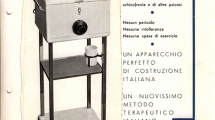Abstract
“In Another Country” draws upon Hemingway's experiences during World War I. Narrated by a wounded young American, this story is a parable of early machine-rehabilitation therapy, one in which the strong optimism of a physician employing new machines is contrasted with the skepticism of an Italian major (“the greatest fencer in Italy”) who, disbelieving in the machines, nevertheless comes regularly for therapy to his hand. That daily attendance is interrupted only when the major's young wife dies suddenly. The major, who had instructed the American never to put himself “in a position to lose,” has himself just “lost” the wife he had married when he felt sure that his own wounding had effectively taken him out of danger of being killed at the front. His continued stoicism offers the young soldier an example of ethical and moral behavior, for after her funeral he resumes his daily routine of machine-therapy. Seen against the ineffectiveness of the machines, the major's behavior seems to offer an example of the only “therapy” possible in this world of wounds and machines.
Similar content being viewed by others
References notes
P.J.R. Nichols,Rehabilitation Medicine: The Management of Physical Disabilities (London: Butterworth, 1976), p. 2.
Glenn Gritzer and Arnold Arluke,The Making of Rehabilitation: A Political Economy of Medical Specialization, 1890–1980 (Berkeley: University of California Press, 1985), pp. 40–41.
Rehabilitation Medicine, p. 3.
A Farewell to Arms (New York: Scribners, 1929), p. 117.
Published originally inScribner's Magazine, 81 (April 1927), 355–57, “In Another Country” was collected first inMen Without Women (New York: Scribners, 1927) and then inThe Fifth Column and the First Forty-Nine Stories (New York: Scrbners, 1938). Since Hemingway's death the story has been included inThe Nick Adams Stories (New York: Scribners, 1972), andThe Complete Short Stories of Ernest Hemingway (New York: Scribners, 1987). All references to “In Another Country” are to the 1927 edition ofMen Without Women.
When F. Scott Fitzgerald read “In Another Country” inScribner's, he told Hemingway that it opened with “one of the most beautiful prose sentences I've ever read” (The Letters of F. Scott Fitzgerald, ed. Andrew Turnbull [New York: Scribners, 1963], p. 300), I find it a strong possibility that Fitzgerald's Praise had something to do with Hemingway's decision to openA Farewell to Arms with a similar sentence: “In the late summer of that year we lived in a house in a village that looked across the river and the plain to the mountains.”
Friedrich Nietzsche,Twilight of the Idols (1888) inThe Portable Nietzsche, sel. and trans. by Walter Kaufmann (New York: Viking Press, 1954), p. 483.
InA Farewell to Arms theCova is mentioned by Frederic Henry's friend as the place in Milan to meet women (p. 11). It is also at theCova that Lieutenant Henry buys a box of chocolate for Catherine Barkley (p. 119).
Author information
Authors and Affiliations
Rights and permissions
About this article
Cite this article
Monteiro, G. The major's therapy: Ernest Hemingway's “In Another Country”. J Med Hum 9, 143–152 (1988). https://doi.org/10.1007/BF01139239
Issue Date:
DOI: https://doi.org/10.1007/BF01139239




